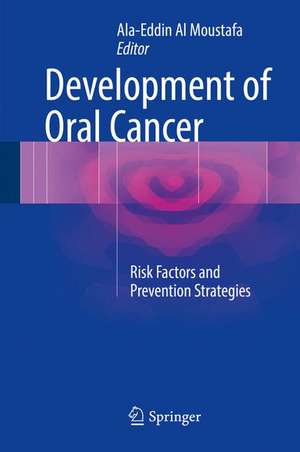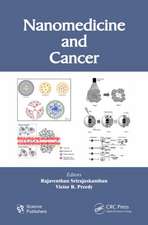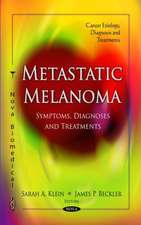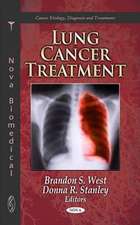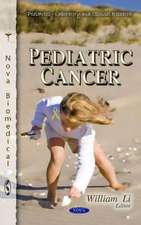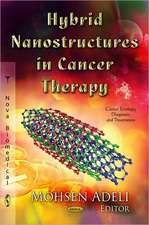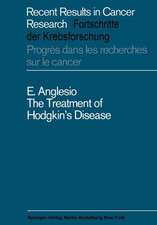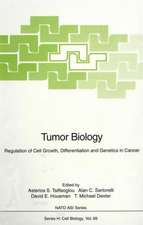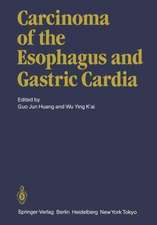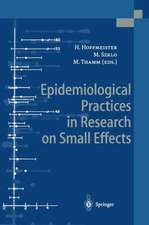Development of Oral Cancer: Risk Factors and Prevention Strategies
Editat de Ala-Eddin Al Moustafaen Limba Engleză Hardback – 15 aug 2017
| Toate formatele și edițiile | Preț | Express |
|---|---|---|
| Paperback (1) | 703.15 lei 38-44 zile | |
| Springer International Publishing – 3 aug 2018 | 703.15 lei 38-44 zile | |
| Hardback (1) | 780.43 lei 38-44 zile | |
| Springer International Publishing – 15 aug 2017 | 780.43 lei 38-44 zile |
Preț: 780.43 lei
Preț vechi: 821.51 lei
-5% Nou
Puncte Express: 1171
Preț estimativ în valută:
149.35€ • 162.18$ • 125.46£
149.35€ • 162.18$ • 125.46£
Carte tipărită la comandă
Livrare economică 18-24 aprilie
Preluare comenzi: 021 569.72.76
Specificații
ISBN-13: 9783319480534
ISBN-10: 3319480537
Pagini: 246
Ilustrații: VIII, 217 p. 26 illus., 22 illus. in color.
Dimensiuni: 155 x 235 mm
Greutate: 0.53 kg
Ediția:1st ed. 2017
Editura: Springer International Publishing
Colecția Springer
Locul publicării:Cham, Switzerland
ISBN-10: 3319480537
Pagini: 246
Ilustrații: VIII, 217 p. 26 illus., 22 illus. in color.
Dimensiuni: 155 x 235 mm
Greutate: 0.53 kg
Ediția:1st ed. 2017
Editura: Springer International Publishing
Colecția Springer
Locul publicării:Cham, Switzerland
Cuprins
Human oral cancer (epidemiology and characteristic.- Novel Developments in the Molecular Genetic basis of Oral Squamous Cell Carcinoma (OSCC)?.- Oral Cancer: After the Completion of the Human Genome Project.- Smoking and Oral Cancer.- Alcohol and Oral Cancer.- High-risk human papillomaviruses and Epstein-Barr virus presence and crosstalk in human oral carcinogenesis.- Oral cancer – Epidemiology and infections (bacterial & fungal) global incidence.- Oral Cancer and Chewing Habits.- Role of Qat Chewing and Mate consumption in human oral carcinogenesis.- Photodynamic Diagnosis and Therapy for Oral: Cancers Detection and Treatment.- Role of Nutrition in Oral and Pharyngeal Cancers: from Etiology to Prevention.- Prevention of Oral cancer.
Notă biografică
Ala-Eddin Al Moustafa currently works, as a Professor/Principal Investigator, in the area of Cancer Biology & Metastasis at the College of Medicine, Qatar University, having previously been a project director at the Lady Davis Institute for Medical Research (LDI) and assistant professor in the Oncology Department of McGill University (Montreal, Canada). Dr. Al Moustafa gained a Master’s degree and a PhD in the field of Oncogenes in the Embryo from the Institute of Embryology of the CNRS and Collège de France and Paris XIII University in 1988 and 1992, respectively, and subsequently completed his training as a postdoctoral fellow at the LDI. He was responsible for founding the Middle-Eastern Association for Cancer Research in 2010 and the Association’s journal (Clinical Cancer Investigation) in 2011. He has published more than 70 international journal papers and book chapters. Dr. Al Moustafa’s research focuses especially on the roles of oncogenes, gene cooperation, and oncoviruses in human carcinogenesis and metastasis.
Textul de pe ultima copertă
This book aims to provide the reader with a complete understanding of the development of oral cancer by explaining the role of a wide variety of implicated risk factors and identifying their gene targets and key regulators. Some of the discussed risk factors are well known, including smoking, alcohol, betel quid chewing, and oncoviruses such as high-risk human papillomaviruses and Epstein-Barr virus; however, careful attention is also paid to less widely recognized factors, such as Qat chewing and yerba Mate consumption. The book concludes by describing and evaluating the most important strategies currently available for the prevention of oral carcinogenesis in humans. In presenting the most up-todate research and knowledge on these topics, this book will serve as a valuable source of up-to-date information for oncologists, cancer scientists, and medical students.
Caracteristici
Examines the role of both well-known and less widely recognized factors in oral carcinogenesis in humans Evaluates the latest research findings Describes the most important cancer prevention strategies Meets the needs of oncologists, cancer scientists, and medical students
